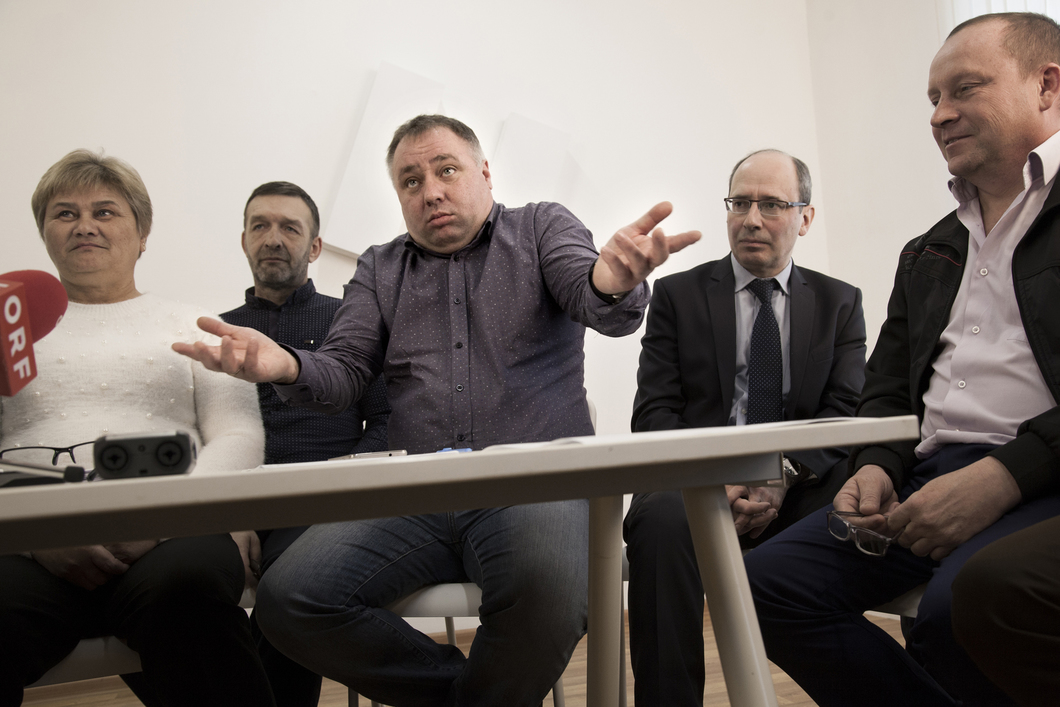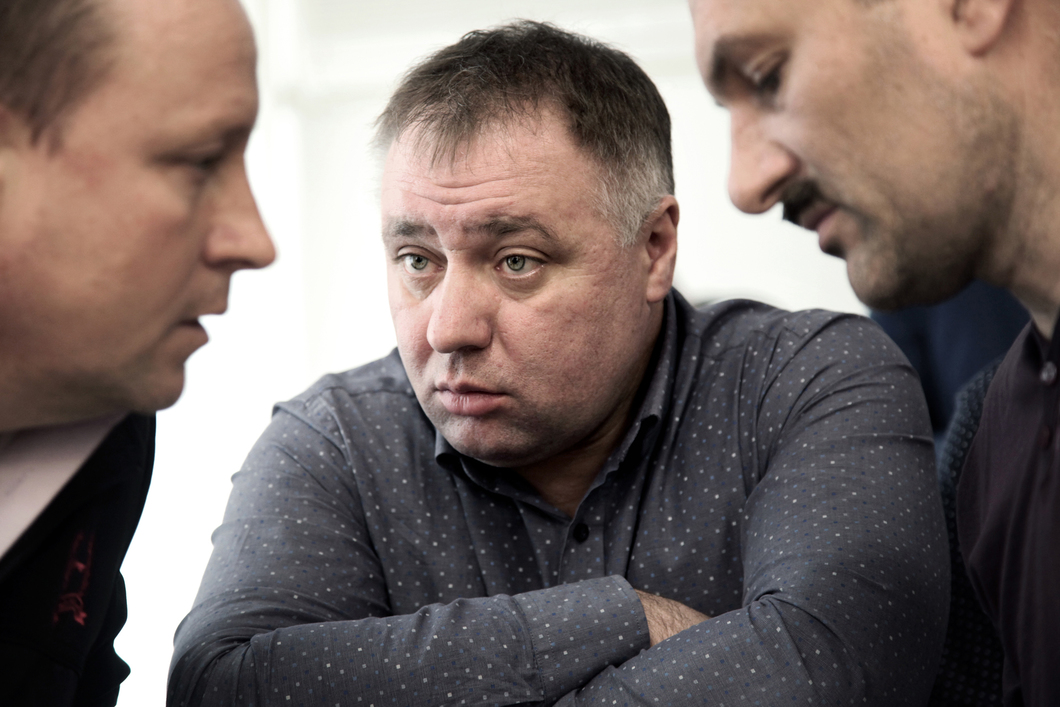Andrei Bazhutin: “More than a Million Trucks Have Stopped Running Nationwide”
Nina Petlyanova
Novaya Gazeta
April 7, 2017
The nationwide strike by Russian truckers continues. The regime’s main weapon against the strikers has been strong-arm police tactics.
Andrei Bazhutin, chair of the Association of Russian Carriers (OPR) and thus the duly elected leader of the long-haul truckers opposed to the Plato road tolls payment system, was subject to the harshest crackdown. On March 27, he was put under arrest for 14 days. He spent five of them in a jail before he was released, but during that time the authorities nearly removed his four children from their home and almost caused his pregnant wife to have a miscarriage. But none of this has forced Bazhutin and his colleagues to give up their fight.
Is 14 days of arrest a fair move in your circumstances? What were you being punished for?
The objective is clear. This was not done at the behest of the traffic police, the police or the other security services. It was a deliberate action on the part of the regime to isolate me. The only thing was that the judge got carried away when she sentenced me to 14 days of arrest. It was cruel and unusual punishment. I didn’t do such a terrible thing to warrant isolating me for 14 days.
What did you do? Had you violated any laws?
All three cases that made it to court were about revoking my driving license. Two of the cases were heard by Judge Marina Afanasieva, who ordered me put under arrest. But in two of the three cases I wasn’t even behind the wheel. It was recorded on video: there is evidence. However, despite that, my license was revoked.
When did you find out you’d been driving with a revoked license?
On March 27, when I was detained. I knew the accusations had been made. We were challenging them, and I was certain we’d challenge them successfully. But what happened, happened. Yet the traffic cops told me I coudn’t have been unaware of driving with a revoked license. Two days before I was detained, however, I drove to Moscow and back in my own car, and no one stopped me. Am so I insane that I would drive a thousand kilometers to another city and back knowing my license had been revoked?
When I was detained, I was driving my son back from practice. He was wearing his wet uniform. We were literally a hundred meters from the house. The 25th Police Precinct, where I was eventually taken, is located in the courtyard of my building. I asked the traffic cop either get behind the wheel himself or let me drive my son to the house, but he categorically refused. Moreover, he sent a message to children’s protective services, after which they decided to take the children into their custody.
What did you do when you found out about this?
While I still had a mobile phone, I telephoned my eldest son, and he ran home. But children’s protective services explained that he was not a guardian and could not stay with the children. Right at that moment, I had been hauled to the 25th Police Precinct. The people from children’s protective services and my son entered our apartment, and they inspected everything, including the refrigerator. Then Artyom called his mom, my wife, and told her everything. She left the hospital, where she had been hospitalized to avoid a miscarriage. [Natalya Bazhutina is seven months pregnant—Novaya Gazeta.] She came home and told the children’s protective services officials that her eldest son and his grandmother were in charge of the children in her absence. But they told her they needed a power of attorney. Natalya hurried to a notary’s office, where she was told the power of attorney could have been made out in the presence of the children’s protective services employees. But they hadn’t told a pregnant woman this. On the other hand, they warned her that if my eldest son or his grandmother took the children outside for a walk, the children would be immediately removed, since they had no legal proof of guardianship.
Did you know what was happening at home when you were in court and in jail?
Not for the first two days. I was isolated. Then someone gave me a SIM card and I called home. By that time, our guys from the OPR were standing constant watch in the courtyard and not letting any outsiders get into the apartment, because there was constant surveillance in the courtyard. A car with some strange young people in it was cruising there round the clock. They vanished only after I had been under arrest for four days.

This was all done to intimidate you?
You can’t intimidate me with such methods. Although recently, who hasn’t been knocking on my door: the police, the tax inspectors, the prosecutors, the FSB. Space aliens haven’t come knocking yet.
Russian officials don’t understand they can’t intimidate us with such actions: I mean truckers in general. These are guys who are used to doing everything themselves. They’ve spent a million nights alone in the woods, in parking lots, on the side of the road. They’ve fixed their own trucks, rustled up food, and defended themselves. They are used to sticking up for themselves. You can’t derail them. That stuff doesn’t work on them.
Do they listen to you?
They do, but not the way they should. We have heard that people in power have been having nervous breakdowns due to us, due to this situation. But that’s not what we want. We aren’t professional protesters. We want to sit down at the negotiating table and solve our problems. What’s happening in the industry is abnormal. More and more truckers are involved in the strike. Some might not park their rigs, but they are riding empty: they’re not hauling cargo. They don’t park on the roadsides, they aren’t involved in our protest rallies directly, but they support us.
Your arrest and the story with your children have not altered your plans?
No way. Of course, I was worried about the children when I wasn’t sure whether the authorities would leave them at home or not. I was worried about my wife and her condition. But I was immediately bombarded with text messages from all over the country. People were willing to help. They were willing to take my family into hiding. I will be cautious in the future. But we’re not going to stop what we’re doing until we achieve something.
What is the mood of the truckers at the moment? How long do they want to strike? How far are they willing to go with their protest?
We won’t end the strike until the authorities make a decision. Whereas at the beginning of the protest, many colleagues said we wouldn’t hold out for more than a week, now everyone is unanimous that we’re holding out till the end.
The main objective is negotiations with Transport Minister Sokolov and Prime Minister Medvedev, who, I imagine, don’t have a clue about our problems. We want them at least to try and figure them out.
In addition, all members of the trucking community should sit down at the negotiating table, even those who don’t share our point of view, because the problem is vast, this is a real sector of the economy, and everyone’s opinions have to to be considered.
Until such a meeting takes place, the strike will continue. We will stay on the road until there is a real solution.
On April 5, Rustam Mallamagomedov, leader of the Dagestani truckers, was detained in Moscow. Have you figure out what happened? How are you going to react?
This is lawlessness. For the longest time, we couldn’t understand who the people who detained Rustam were. Were they from the Moscow Criminal Investigation Department or the FSB? We still don’t know what their beef with Rustam is. But we sent in the lawyers and human rights activists immediately. It worked, and Rustam is now free. We’re going to Makhachkala together. On April 7, truckers from Dagestan, Kabardino-Balkariya, and Chechnya will be meeting there with reporters. On the way back to Moscow, we’ll be holding similar meetings in Ossetia, Kransodar, and Rostov-on-Don, because there is a deficit of information in the media about the strike.
Why has Dagestan become the hottest spot?
In Dagestan, 90% of the drivers are private carriers. The republic is small, and so the strike is in everyone’s face. We have strikers spread across the entire country, but Russia is so vast that it’s not so noticeable, although a huge number of people are on strike. We’re going to summarize the numbers by April 10. We want to count the number of regions in which there are protest camps, and the number of people in these camps, as well as where the camps are, and where they were until the police dispersed them.
We will try and give an overall picture for every city in Russia. It’s complicated. In Petersburg alone, there are more than 200 parking lots, and we have to make the rounds of all of them. There are also people not involved openly in the protest, but who support it and have parked their trucks. We have to take them into account, too. Currently, not even the traffic cops and the police have those stats. But I can say for sure that at least half of all truckers have now stopped working as of today. In terms of numbers, that’s more than a million trucks.
Translated by the Russian Reader


